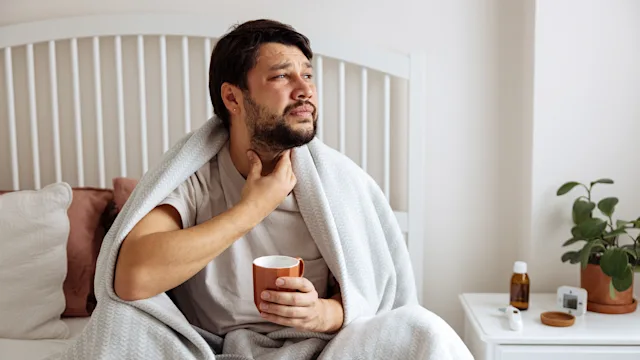Key takeaways:
Respiratory conditions like asthma and chronic obstructive pulmonary disease (COPD) are common illnesses. And they can be made worse or triggered by irritants and allergens in the air.
Air purifiers are filtration units that remove dust, dander, smoke, pollen, and other particles from the air.
With the help of your provider, you can figure out which air purifier is best for you. This will depend on factors like your medical condition and the size of your rooms in your home.
If you or a loved one lives with asthma or chronic obstructive pulmonary disease (COPD), you probably know that allergens in the air can worsen symptoms. And this can make it harder to maintain good control of your health.
Air purifiers work by removing these particles from the air. So part of the treatment plan designed by your healthcare team might include using an air purifier in your home.
Let’s review how you can choose the best one if you have asthma or COPD.
Do air purifiers help asthma and COPD?
It depends.Air purifiers can lower the number of particles in the air that can act as triggers for asthma and COPD. But, the evidence isn’t strong that this will actually improve your symptoms.
The air in your home or office is filled with microscopic irritants or allergens. When you breathe them in, these particles can cause lung irritation that can make it harder to breathe. Allergens can fill the air as a result of smoke, pets, pollen, and other irritants.
Air purifiers only remove particles floating in the air. They don’t work to limit or remove irritants on surfaces like a pillow or stuffed animal that may be covered in dust. Air purifiers also don’t capture allergens that are trapped in carpets. But when a carpet is vacuumed, this can send many particles into the air where they are captured by an air purifier.
What is the best air purifier for asthma?
There are dozens of air purifiers on the market. In general, there are three types of air purifiers that may help in easing symptoms of asthma and COPD. Ask your provider for guidance on the type of air purifier that may work best for you.
HEPA (high-efficiency particulate air) purifiers
HEPA purifiers have pleated filters that trap tiny particles. With the help of a fan, the air is pushed through the filter capturing the allergens while pushing out cleaner air. This can help to limit your exposure to air particles that are asthma and COPD triggers.
HEPA filters are very effective for particles like:
Pollen
Dust
Smog
Smoke
Read more like this
Explore these related articles, suggested for readers like you.
In some HEPA purifiers, the filters are washable rather than disposable. This could save you a few dollars in the long run. Other products use filters that are thrown away and replaced. How often the filter needs to be replaced depends on the specific model, how often you’re using it, and the volume of particles it’s filtering. Checking it once a month is a good idea.
Electrostatic cleaners
This type of air purifier uses electrically charged plates to trap particles. The purifier draws air in over an electronic cell and particles in the air are electrically charged. They then stick to a series of collector plates in the unit, removing them from the air. This can improve the quality of the air you breathe if you have COPD or asthma.
Depending on the size of the area and your purifier, you may have to clean these plates daily or weekly. It’s important to note that some of these units may also produce ozone. This, ironically, can be an irritant for those with asthma or COPD. Keep an eye on your symptoms to make sure they are improving with use.
Ionizers
These units give off electrically charged ions that attach to air particles in the room. This forces the particles to cling to your curtains or shades, walls, or other surfaces instead of floating around the room.
Ionizers are better for removing larger particles found in smoke, but may not remove pollen or dust as well. These purifiers may also make a small amount of ozone, which could be irritating for those with asthma or COPD in some cases.
How do I know which purifier is right for me?
With so many different types to choose from, it may be confusing to know which air purifier is best for your environment. When looking at an air purifier, you should consider how effective the unit is at actually cleaning the air in your home or office. This will help you figure out how many particles it can remove to lessen any asthma and COPD triggers.
Let’s review some important features to look for.
Efficiency values
The higher the minimum efficiency reporting value (MERV), the better. This means the purifier does a better job at filtering particles from the air you breathe. HEPA filters are a good option because they can remove about 99.7% of allergens that pass through them. The rates for other types of purifiers may not be as high as HEPA units.
Clean air delivery rating (CADR)
Air purifiers vary greatly in size. That’s why it’s important to match the air purifier’s cleaning ability to the size of your room. You can do this by looking at the clean air delivery rating (CADR). The higher the CADR, the larger the room size a purifier can work for.
Are air purifiers HSA/FSA eligible?
An air purifier could be eligible for reimbursement with a health savings account (HSA) you’ve funded with pre-tax wages. It also might be more affordable if you have a letter of medical necessity (LOMN) or prescription from your healthcare provider.
Medicare doesn’t usually cover the cost of air purifiers, room heaters or dehumidifiers. But some plans may cover supplemental benefits like air purifiers. It’s a good idea to check with your insurance company to see if an air purifier unit may qualify.
The bottom line
Dust, dander, and pollen can make breathing hard, especially if you have asthma or COPD. Air purifier units filter the air in a room and help make breathing easier by removing irritants. You’ll need to consider the size of the room, your medical condition, and the efficiency of the air purifier.
In general, HEPA filtration units remove the most particles. Your healthcare provider can help you figure out which one is best for you.

Why trust our experts?

References
Centers for Medicare & Medicaid Services. (n.d.). Humidifiers.
U.S. Environmental Protection Agency. (2008). Guide to air cleaners in the home.
U.S. Environmental Protection Agency. (2022). What are ionizers and other ozone generating air cleaners?
U.S. Environmental Protection Agency. (2022). What is a HEPA filter?
U.S. Environmental Protection Agency. (2023). What is a MERV rating?

















